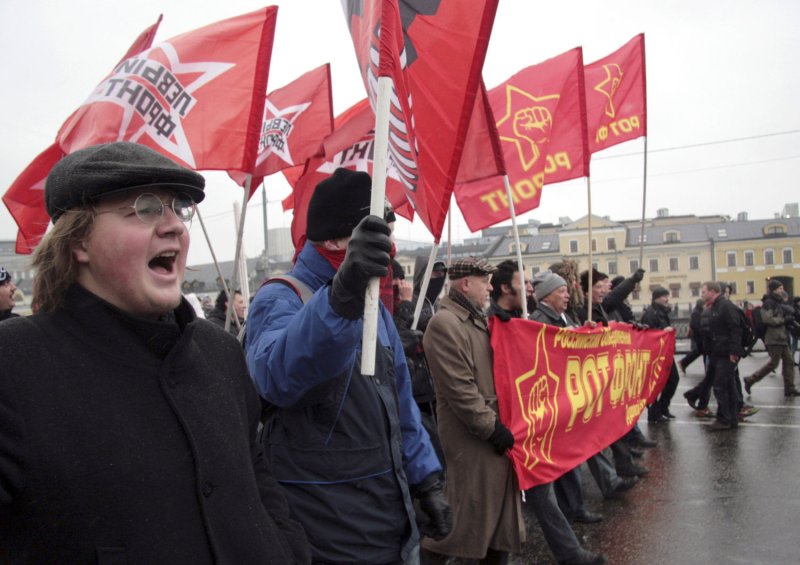Protesters march during a rally against official results of the parliamentary elections in Moscow on December 10, 2011. UPI . |
License Photo
WASHINGTON, Dec. 13 (UPI) -- Russia's political dissidents are planning a Dec. 24 demonstration in Moscow to symbolically skewer Prime Minister Vladimir Putin and his United Russia Party.
The clarion call is annulment of Dec. 4 parliamentary elections, which protesters say were manipulated by Putin and rife with fraud and intimidation. But spurring discontent as well is growing dissatisfaction over Putin's authoritarian dominance of the country's political life and corruption by government officials.
The United Russia Party is one of four political parties in Russia's Parliament, or Duma. Prior to the Dec. 4 election, it held 315 of the Duma's 450 seats, giving it the majority required by the country's Constitution through which Putin was able to push through any legislation he wanted.
Other parties in the Duma -- the Communist Party, the Liberal Democrat Party and "A Just Russia Party – split the remainder. But those parties exist with the blessing of the Kremlin.
"This is not a genuine opposition. These are parties that have existed at the Kremlin's discretion all these years and depend on the Kremlin for financing," said Maria Lipman, editor of the Pro et Contra journal of the Carnegie Moscow Center.
"Now their bargaining power has grown somewhat but it's inconceivable that they would form a kind of opposition that would bring the missing political openness to the Russian scene.
"Those political forces that care about issues such as democracy and checks and balances and such are not in the Duma," she said in an interview with the Council on Foreign Relations.
Following the December vote, Putin's party saw its grasp on the Duma drop to just less than 50 percent -- a result that underlines voter discontent with Putin's 12 years in power and the prospect of more to come. Putin served eight years as president, and when constitutional term limits required his vacating the office he hand-picked his successor, Dmitry Medvedev, and became prime minister.
Now Medvedev is stepping down and Putin is running for president again in an election scheduled for March. With no real opposition candidate, the result of that vote could be a foregone conclusion.
"Russia will be free, "Russia without Putin," "United Russia is a Party of crooks and thieves," protesters chanted in Moscow after the Dec. 4 vote. Similar refrains were sounded in other cities around the country as political parties not recognized by the Kremlin, their supporters, and others took to the streets.
As many as 50,000 people rallied in Moscow. Among them were said to be communists, students, ultra-nationalists, professionals and members of the country's growing middle class.
Surprisingly, there was no government crackdown on what observers say was the largest street protest in Russia since the collapse of the Soviet Union and the tumult that followed in the 1990s.
State television also reported on the event.
It's speculated that Putin's lack of an iron-fist crackdown on dissent is part of a maneuver to buy time while deciding how to diffuse the protests, which the Kremlin hopes will eventually peter out.
Other actions taken by the Kremlin include Medvedev announcing an investigation of alleged election malpractices. Medvedev, in making the announcement, however, noted he didn't believe there would be enough incidents found to significantly alter the vote tally.
As for dissident demands for new parliamentary elections, government officials have said the Dec. 4 results will stand.





